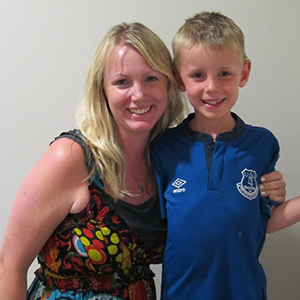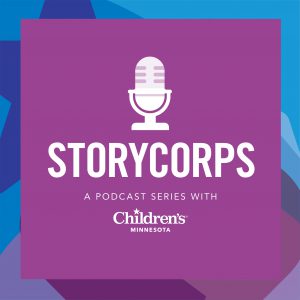Hemophilia: Kari and Andreas’s story


About this episode
Mother, Kari, and son, Andreas, discuss what it is like to receive prophy infusions. Kari discusses her journey to parenthood while being a carrier of an unknown, rare, hemophilia mutation. The importance of both community and marital support is valued by Kari.
Topics:
- Diagnosis: Past Family History
- Support: Hospital/ Clinic Staff
- Resilience: Faith
- Treatment: Advice/ Messages
Transcript
Andreas: I’m special because I have a port and I have hemophilia.
Kari: Tell me about what it means to have a port?
Andreas: I get a needle in it.
Kari: Tell me what is it like getting your medication?
Andreas: It’s like I’m getting a little bite on my port, a tiny one, but it doesn’t hurt that often.
Kari: And how often do you get infusions? How often do you get medicine?
Andreas: Every other day.
Kari: Are you ever scared?
Andreas: When I was little I was scared to get the needle in, but I had numbing cream on, so it didn’t hurt that much.
Kari: How often do you get medicine? How often do we infuse you?
Andreas: Every other day
Kari: I wasn’t certain that I wanted to have children because I knew that I carried hemophilia. My mom carries it as well and we’ve done genetic testing, they discovered that the specific mutation we have has not been registered anywhere else, so we have a very unique mutation. So there was no way to know if this mutation carried mild, moderate or severe; they just knew it was the gene for hemophilia. So I chose to be tested when I was in college and found out that I was a carrier, so I knew that before I met Vidar and told him about it right away. For me, it was a concern of mine having children, if we would have children with hemophilia and for him it wasn’t even an issue. We talked a lot about it and one of the biggest things that changed my mind was not only Vidar’s attitude towards it, but we met with Vicki Hannaman. We talked with her and she explained everything to Vidar and we talked some more and she kind of changed my perspective on everything. Just helping me recognize that even if we had children with hemophilia that it’s something that we would be able to handle. It wouldn’t be as big of an issue as I was thinking it would be.
I grew up in a family with pastors and I think her dad is a pastor. She even said, ‘you know God says be fruitful and multiply.’ She said, ‘go and have children. No matter what, those kids will be so lucky to have you as parents.’ That was a life-changing moment for me. So then Andreas was born, at birth they took his cord blood and sent it in for testing. And then I think it was the next day that the pediatrician we had chosen for Andreas came and told us.
So when Andreas was a year-and-a-half, we were at my parents’ house and he fell. He got a big bump on his head, but there were no other signs at that time of any bleeding but he was still unconscious, we were all gathered around his bed. All the doctors, I don’t know if there were seven or eight different doctors and they’d already done an MRI, so they knew that he had bleeding in his brain; they’d seen the bleeding at the base of his brain. They told us they didn’t know how long it would be until he woke up and when he did wake up they said they didn’t know the extent of brain damage; they didn’t know if he would be able to speak. They did know that he was paralyzed in half his body. The left side of his body was paralyzed. They said there’s therapy you can do for speech and for movement.
At that point I didn’t care about any of that. As long as he was alive it didn’t matter. As the doctors were there talking, after they told us that, Andreas regained consciousness, woke up, and he looked around. He looked at all the doctors standing there and in sign language he said to them, thank you.
Jocelyn: So now he gets prophy now? Can you tell us about that?
Kari: Yes, now he gets prophy. It’s every other day, Lucas as well, because Lucas has a port, too. They get infused every other day and that’s to prevent bleeds. Yeah, they’ve done extremely well. It was tough with Andreas when he was little. There were many times we had to hold him down, and that was due to a couple of scary incidents in the ER when the nurses there weren’t used to ports. It caused some pain and that scared them and Vidar is the one who typically accesses the port with the needle. I’m there and hand over the supplies. We each have our jobs. We have the whole procedure down and they do so well. Lucas loves to help, so he helps to push in and has learned what everything is, the saline, the heparin, the factor VIII, It’s fantastic that Lucas has Andreas as an older brother that he looks up to and sees, and sees how well Andreas does. It’s wonderful to have that example. They are amazing boys, extremely brave, which makes the whole infusion process go very easy.
Jocelyn: Who or what has been most supportive or helpful to you?
Kari: I can’t say enough about Vidar. He has been such an incredible support and strength through all of it. What he does for those boys, too, and he never complains. There’s no blame or no anger or resentment on his part. He’s just amazing.
My parents have been such a huge support as well. Just recently, in the past couple of years, extremely helpful for me has been meeting, as we call them, other hemo moms, other moms with boys with hemophilia. When our boys were little I was extremely overprotective of them and thought that I’m this crazy mom. It was like I could just breathe and say, OK, it’s not just me. It’s not just me, hearing that. There are other people, too, who go into their room in the dark and cry and are so scared about taking their boys out in public that they won’t go to a playground or have had bad encounters with people making comments about the bruises on their sons’ bodies. It’s helpful to know that there are other people out there who have similar experiences that you can share One thing that has been hugely beneficial for me is hearing older boys who have hemophilia share their stories and to hear how they are thriving. And I remember hearing one of the boys saying that he knew his mom struggled with guilt, which is something that I have struggled a lot with, he said that he’d never, ever blamed her for it. And that was huge to hear that. For me what has been life changing is letting go of the guilt has been huge blaming myself for the reality that our boys have hemophilia and that I passed it on to them, but through help from some of my friends and conversations I have been able to let go of the guilt. And, so, my advice to some of the moms, because I think they are the ones who feel the most guilty is let go of the guilt. It’s not your fault. Be kind to yourself. I think also, let others help you. It’s easy to shut people out and to shut down, which I have done as well. Make sure that you do somehow prioritize your marriage, because you need each other and you need the support, and to be open about how you’re experiencing the hemophilia.
There are a lot of positive things that have happened in our life because of hemophilia. Not only seeing the strengths of our children and of ourselves, but meeting some amazing people and having some wonderful experiences that we wouldn’t have had- they are an inspiration to so many people and have touched so many lives, not only in our family but other children and our friends and even beyond that.
We wish to extend our thanks to the families who have shared their story here about the impact of living with hemophilia and sickle cell disease. We would also like to thank the many who worked on this project:
The Children’s Minnesota StoryCorps Legacy Team:
Eddie Gonzalez, Jocelyn Bessette Gorlin, Susan Kearney, Stephen Nelson, Margaret Heisel-Kurth, Stephanie Davis, Angela Blue, Elizabeth McDonough, Jill Swenson and Alisa Linne.
Special thanks to:
Stephanie Moua, Hamdi Hussein, Sadia Farah, Fatima Ali, Caillyn Costello, Suzanne Lehman, Suzan Ulrich, D'Ann Urbaniak Lesch, Justin Nelson, Allison Albright, Marvin Holmes-Leopold, Jose Rodriguez and Mitch Hare.
Minneapolis Institute for Production and Recording:
Jose Rodriguez and Mitch Hare.